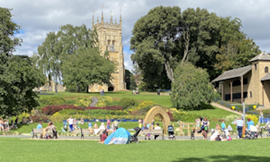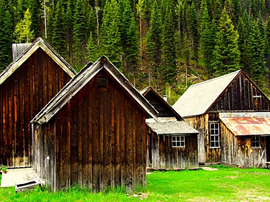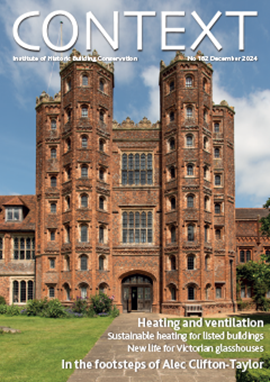RAAC causes temporary closure of St Davids Hall
Image for illustration – St David’s Hall by Jklo286 – Own work, CC BY-SA 4.0
[edit] IHBC’s RAAC update: Temporary closure of Cardiff’s St David’s Hall
Cardiff Council has issued a statement that the newly listed St David’s Hall is to temporarily close to the public to undertake additional checks on the Reinforced Autoclaved Aerated Concrete (RAAC) panels in the building.
St David’s Hall writes:
The decision has been taken in light of the recent change to advice on RAAC in public buildings issued by the Health and Safety Executive (HSE) and following further discussions with the Council’s appointed independent structural engineers, and the council’s insurers.
The council has been aware of RAAC in St David’s Hall and the need to manage it from a health and safety viewpoint since 2021, and it has always followed government guidelines and advice to ensure the building was safe.
A building management and health and safety strategy has been implemented at the venue for the past 18 months. This included regular inspections by independent structural engineers with specific RAAC expertise.
Throughout this time no issues were raised about the condition of RAAC in the building and there was no evidence of deterioration – and this remains the case.
However, the Council has continued to engage with its insurers and expert structural engineers and, based on advice received today from those experts, we believe it is prudent and responsible to carry out intrusive surveys to further reassure ourselves and the public on the safety of the Hall. This will require drilling into panels to confirm their interior construction and to determine if any further work is required to ensure continuing safety.
Consequently, we will be bringing structural engineers – who are RAAC experts – back on site to do fresh tests on RAAC panels in the building.
We expect this procedure could take at least 4 weeks, and we will look to re-open the Hall as soon as possible, dependent on any action which may or may not be required.
We know this will cause a lot of inconvenience and disappointment, and we would like to apologise to all our customers, but we hope you will understand that the safety of audiences, staff, artists, volunteers, and everyone at the venue is paramount, and that the Council is obliged to act in response to the updated HSE guidance and expert advice.
We will be contacting promoters and hirers to discuss the potential for rescheduling performances and to review all other options. There is no need for customers to contact St David’s Hall, we will be in touch with all ticket holders about options available to you once we have spoken with each affected show’s promoter. We would be grateful if customers could give us the space to undertake this work so that we can come back to you as quickly as possible about your ticket purchase/cancelled event.
The Council has been consistently clear on the need for investment into St David’s Hall to secure its long-term future, addressing the RAAC and other maintenance issues, all of which was confirmed in a Cabinet report last year.
We continue to work to progress the transfer of the hall to Academy Music Group (AMG). Ahead of taking over the operation of St David’s Hall, AMG had already undertaken its own inspections and has plans in place to undertake remedial work required in the medium to long-term. We will be keeping them appraised of the actions we are taking.
Once again, we apologise to customers of St David’s Hall for the late cancellation of shows, and we want to reassure you that we will be in touch to discuss rescheduling of performances and/or alternatives. Please follow the St David’s Hall website’s news section, for updates. Thank you for your understanding and patience.
This article appears on the IHBC news and blog site as "IHBC’s RAAC update: Temporary closure of Cardiff’s St David’s Hall" dated September 15, 2003.
--Institute of Historic Building Conservation
[edit] Related articles on Designing Buildings
- Aerated Concrete.
- Autoclaved Aerated Concrete.
- Aggregate.
- Alkali-activated binders for precast and ready-mixed concrete products: New supply chains, business models and environmental benefits.
- Alkali-silica reaction (ASR).
- Binding agent.
- Cement.
- Cement-free precast product.
- Cement mortar.
- Concrete.
- Concrete masonry unit CMU.
- Ferro-cement.
- Fibre cement.
- High alumina cement.
- Lightweight concrete solutions.
- Lime mortar.
- Limestone calcined clay cement LC3.
- Mortar.
- Mortar analysis for specifiers.
- Mundic.
- Plaster.
- RAAC.
- Reinforced Autoclaved Aerated Concrete.
- Portland stone.
- Screed.
- Shotcrete technology.
- Stucco.
- Thomas Edison's concrete cottages.
- Types of cement.
- Types of concrete.
- Portland cement.
IHBC NewsBlog
SAVE celebrates 50 years of campaigning 1975-2025
SAVE Britain’s Heritage has announced events across the country to celebrate bringing new life to remarkable buildings.
IHBC Annual School 2025 - Shrewsbury 12-14 June
Themed Heritage in Context – Value: Plan: Change, join in-person or online.
200th Anniversary Celebration of the Modern Railway Planned
The Stockton & Darlington Railway opened on September 27, 1825.
Competence Framework Launched for Sustainability in the Built Environment
The Construction Industry Council (CIC) and the Edge have jointly published the framework.
Historic England Launches Wellbeing Strategy for Heritage
Whether through visiting, volunteering, learning or creative practice, engaging with heritage can strengthen confidence, resilience, hope and social connections.
National Trust for Canada’s Review of 2024
Great Saves & Worst Losses Highlighted
IHBC's SelfStarter Website Undergoes Refresh
New updates and resources for emerging conservation professionals.
‘Behind the Scenes’ podcast on St. Pauls Cathedral Published
Experience the inside track on one of the world’s best known places of worship and visitor attractions.
National Audit Office (NAO) says Government building maintenance backlog is at least £49 billion
The public spending watchdog will need to consider the best way to manage its assets to bring property condition to a satisfactory level.
IHBC Publishes C182 focused on Heating and Ventilation
The latest issue of Context explores sustainable heating for listed buildings and more.

















